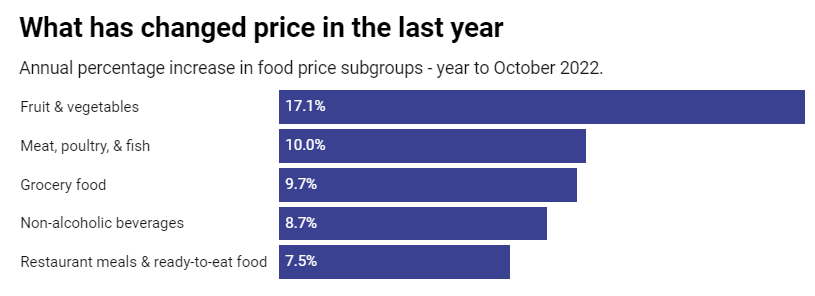
Food prices jumped 0.8 per cent in the month of October - and fruit and vegetable prices alone increased by 17 per cent.
Stats NZ released the data late this morning.
“This was the highest annual increase since November 2008,” Stats NZ consumer prices senior manager Nicola Growden said.
Compared with October last year, grocery food prices were up by 9.7 per cent.
“Increasing prices for barn-raised eggs, cheddar cheese and two-minute noodles were the largest drivers within grocery food,” she said.
“Previous patterns of seasonal price movement for fruit and vegetables suggest it’s more typical to see a larger fall in fruit and vegetables for the October month."

Monthly food prices were 0.8 percent higher in October 2022 compared with September 2022. After adjusting for seasonal effects, they were up 1.8 percent.
Fruit and vegetable prices fell 5.2 percent, but after seasonal adjustment rose 1.3 percent.
Restaurant meals and ready-to-eat food prices jumped by 7.5 percent in the past year.
Meat, poultry and fish prices increased by 10 per cent, while non-alcoholic beverage prices surged by 8.7 per cent.

Immigration issue
The National Party said the Government must address immigration settings to fix labour shortages.
“New Zealanders are facing pressure at the pump, mayhem with their mortgages, and a crisis at the checkout,” finance spokeswoman Nicola Willis said.
“The cost-of-living crisis is only getting worse and Labour has done nothing to get it under control.
“Today’s numbers are sobering, and even more bad news for Kiwis trying to get ahead. Not since the worst days of the Global Financial Crisis have we seen such rapid food price growth," she said.
“There is no escaping these eye-watering prices. For parents cooking dinner at home for their kids, they face produce prices climbing 17 per cent, and meat prices increasing 10 per cent.
“Even those desperately trying to save on their grocery bill are being hit hard, with the increase in the cost of two-minute noodles up 37 per cent."
Willis said the Government was abdicating responsibility for rampant inflation.
“It is clear that widespread labour shortages are having an impact on driving up the grocery bill for Kiwis. The Government must urgently fix their broken immigration settings that are pushing up prices across the economy."
Cluster of causes
ANZ economist Finn Robinson said businesses including food suppliers and retailers were facing rising costs and had to at some point pass some of those increases on to consumers.
He said it was surprising to see a jump in prices last month when usually October brought a 0.5 per cent decrease.
“It was certainly a stronger [result] than we had anticipated.”
Bad weather and disruption to supplies was impacting prices, as were rising labour costs and worker shortages, he said. “All of these costs really start to add up.”
The Stats NZ data was published shortly after new data in the United States showed inflation cooling dramatically in that country. Stocks in the US surged overnight on news inflation there slowed in October - but an ASB economist said food price inflation in New Zealand would probably still be high for a while.
Annual food price inflation had now surpassed 10 per cent for the first time since 2008.
ASB senior economist Mark Smith said the increases reflected jumps in meat and grocery food prices.
The 1.8 per cent seasonally-adjusted climb in October was the biggest monthly leap in more than five years, he said.
“Price rises also look to be becoming more ingrained and broad-based."
Beef, pork and lamb all increased more than 3 per cent last month, and chicken was up 1.3 per cent.
Coffee and soft drinks were getting more expensive, and driving the rise in non-alcoholic beverage prices, he said.
Rising wage costs were probably the main driver of a 7.5 per cent leap in restaurant meals and ready-to-eat food prices.
“Global food commodity prices have cooled a fraction of late, and the outlook is for some cooling in annual NZ food price inflation has yet to peak,” Smith said.
“However, the risk is that the current upward momentum in food prices takes longer to slow.”












